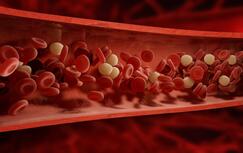 What?!! Why would we say that? 'NO', in this case, stands for Nitric Oxide and it is quite important for your heart and overall cardiovascular health. Unfortunately, the ability of our bodies to make NO decreases significantly as we age. Thankfully, we have a backup system of NO production that happens in our mouths when we eat nitrate-rich foods. But, let's start with a little more background since the field of nitric oxide study is fairly new. NO is a gas when produced in the body and is a simple molecule made up of one atom of nitrogen and one of oxygen. This molecule is so important that it was named “Molecule of the Year” by Science Magazine in 1992, and in 1998, a Nobel Prize in Physiology or Medicine was awarded to the three US Scientists responsible for its discovery. What is really important, though, is how crucial NO is to our overall health. While there is much research showing the benefits to the heart and cardiovascular system, NO also helps with everything from supporting the immune system to easing depression to reducing the risk of diabetes and kidney disease. Since NO is a signaling molecule, there is really no cell or tissue in the body that doesn't need healthy levels of NO. NO signaling tells arteries to relax and expand (lowering blood pressure), immune cells to kill bacteria and cancer cells and brain cells to communicate with each other. There are two ways that the body is able to make much-needed NO. The first way requires the endothelial cells (cells lining the blood vessels) to metabolize NO from L-arginine. The ability of the body to produce adequate NO from this process reduces significantly as we age due to numerous factors (i.e. poor diet, toxicities, lack of exercise, EMFs, stress, genetics, etc.). This is why supplementing with L-Arginine may not be effective for many to raise nitric oxide levels. The second way depends on having the correct bacteria in the mouth (oral microbiome). When we eat foods containing nitrate, it is metabolized by the bacteria living on the back part of our tongue into nitrite. This is a good reason to chew your food slowly to ensure that as much of the nitrate-rich foods you consume come in contact with this important bacteria as possible. We also need to avoid killing off this very necessary oral microbiome through use of antiseptic mouthwash, fluoride-containing toothpaste or antibiotics. When we swallow nitrite, stomach acid converts it into the magical molecule of NO. When stomach acid is being reduced by meds, antacids or blocked by PPIs, NO will not be produced in sufficient quantities. More recently, it has also been found that nitric oxide is produced in the paranasal sinuses. This NO will normally reach the lungs with inspiration, especially during nasal breathing. Another good reason to stop mouth breathing! There are a number of general things you can do to help your body with NO production. You've likely already heard them all more than once:
Here are some more specific recommendations:
0 Comments
|
AuthorCarl Malone Categories
All
Archives
March 2024
|

